9 Tips to Help You Get A Better Night’s Sleep
Mythbusting moment: Getting fewer hours of sleep is not a “natural” part of aging.
Your sleep needs may change through different phases of life, but the prevailing logic that it’s inevitable for seniors to get less sleep is more than harmful – and this study proves otherwise.
After studying the sleep patterns of 130 people, researcher Arcady Putilov found that seniors and older adults have changing sleep times, but not changing sleep needs. The only shift is in their circadian rhythms.
In other words, an older adult’s sleep needs remain the same.
The quality of the sleep you get is your “sleep hygiene.” Improving your habits around your sleeping routine is one of the best ways of ensuring that your overall health – mental, physical, and emotional – is well-cared for.
So with that in mind, we’ve got nine tips to help you experience a restful, deep sleep that promotes an improved quality of life.
What Risks Does the Aging Brain Face Because Of A Lack Of Sleep?
Sleep is one of the most basic and imperative needs. It promotes greater levels of concentration, wellness, immunity, and healing.
But for the aging brain especially, sleep is necessary because seniors and older adults are prone to disorders and diseases related to memory loss and cognitive impairment.
There are three types of sleep disturbance for seniors – sleep latency, sleep fragmentation, and an overall decline in REM sleep. As you age, the “architecture” of your sleep changes. You may find yourself going to bed earlier – but you’ll also wake up earlier.
This changing pattern – due to a shift in energy levels and the body’s natural circadian rhythm – is a normal part of aging. Sleep disturbances like insomnia, however, are not.
Yet despite this fact, at least 44% of older people report regular symptoms of insomnia as they age.
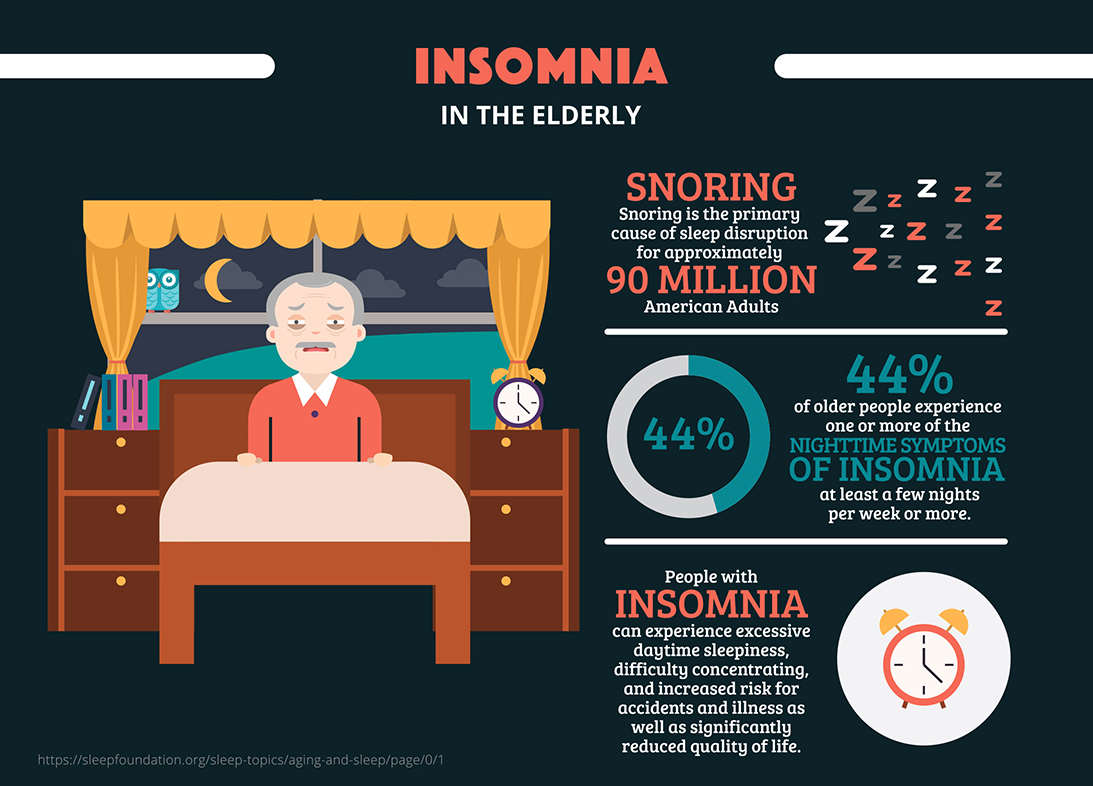
Image Source
To compensate, many choose to indulge in daytime naps or other solutions. But the truth is that without proper sleep, older adults are at risk. Studies show that there are undeniable links between poor sleep hygiene and strokes, among a wider variety of issues:
- Serious medical and psychiatric issues
- Necessity for added medications for chronic ailments
- The regular use of over-the-counter sleep aids
- Additional sleep disorders like sleep apnea, periodic limb movement disorder, and restless leg syndrome
Issues with sleep are not an isolated incident nor are they a “normal” part of aging.
One in three seniors has trouble falling asleep, one in eight has restless leg syndrome, and many are already on medication that disrupts sound sleep.
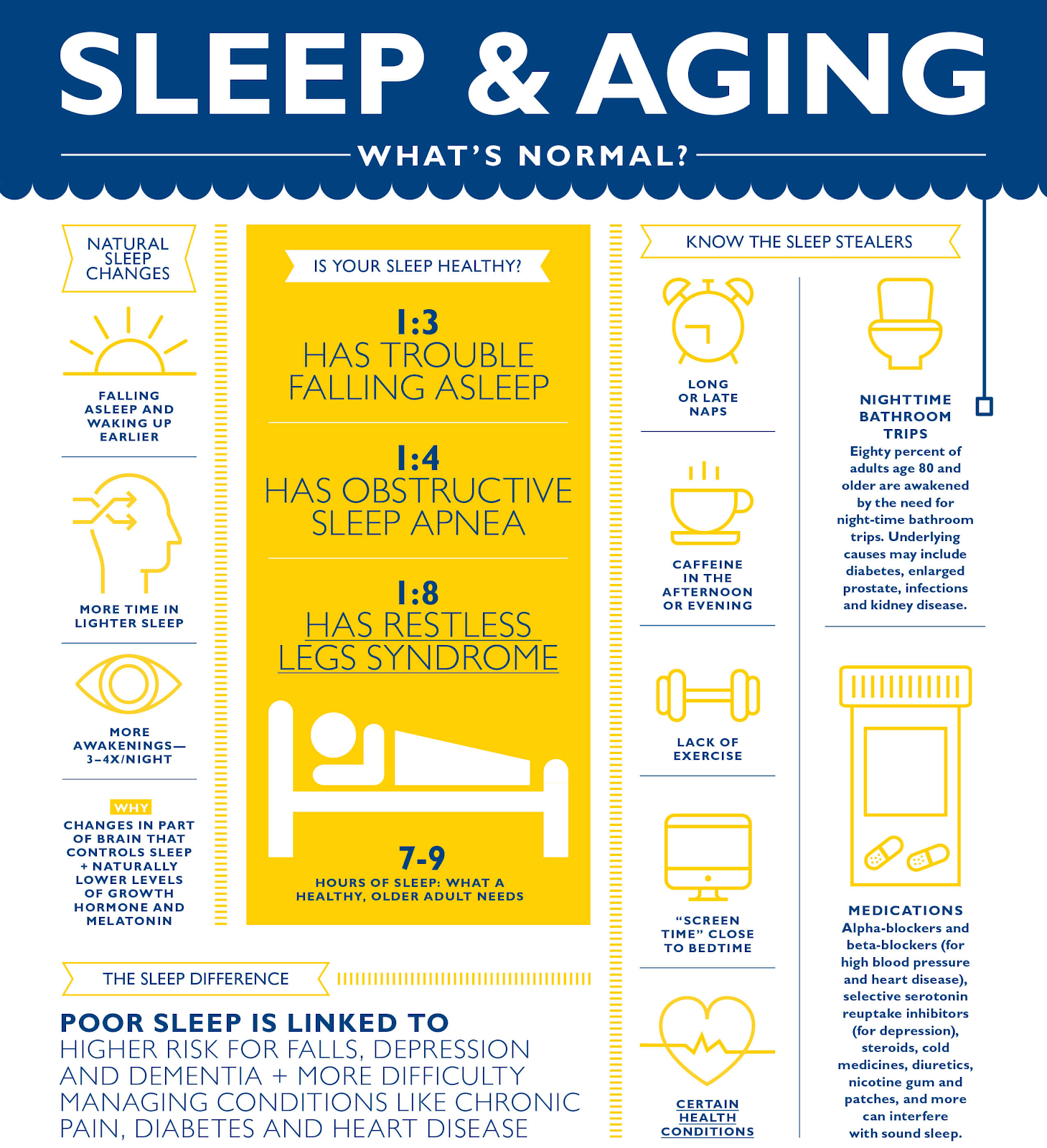
Image Source
These individuals are also the ones who are more prone to:
- Depressed moods
- Attention and memory problems
- Excessive daytime sleepiness
- More nighttime falls
- Heavy (and ineffective) reliance on over-the-counter or prescription sleep aids
Ironically, sleeping aids are not the way to go because these exacerbate the problem. So an interrupted, deep state of sleep is crucial to keeping these issues at bay.
9 Tips to Help You Get A Better Night’s Sleep
How do you achieve that constant state of deep sleep? And what do you stand to gain from a full seven to nine hours?
Studies published in the Journal of Clinical Sleep Medicine prove that older adults maintain the highest cognitive abilities over time when they’re consistent with their sleep routine. Other benefits researchers observed included:
Improved sleep quality and duration in seniors could help lower the risk of age-related cognitive impairment and decline
An increased risk for brain patterns that resemble those of patients with Alzheimer’s
Poor memory, which is a contributing factor for dementia
A decline in routine cellular repair and restoration
A loss in concentration and a drop in emotional well-being and stability
More significant levels of fatigue, lower threshold for pain, and an increased number of falls related to chronic pain and inflammation
Significantly decreased risk of over-the-counter and prescription medication
Increased levels of overall body immunity and a more rapid response to common colds and the seasonal flu
If there’s so much to gain, why aren’t you sleeping better? It may be due to notorious “sleep stealers.”
Things like late naps, caffeine, and prolonged screen use affect almost everyone. But for the aging brain that is already experiencing a shift in sleep times and energy levels, these stealers have a deeper impact through the night.
How can older adults start to build better sleep hygiene?
Here are nine tips to help you ensure you’re getting those seven to nine hours of sleep – without waking three to four times through the night:
1) Start With Tracking Your Sleep Patterns
The aging brain experiences a change in the way that neurons regulate sleep. When compared to a young adult’s brain, there is a decrease.
And older brains do end up spending less time in deep sleep by comparison:
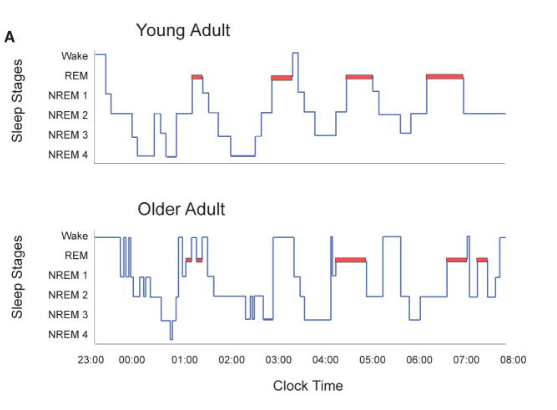
Image Source
So the rhythm of your sleep certainly changes, but the quality is still important. But knowing what your body’s natural sleep patterns are the best place to start when addressing poor sleep hygiene.
That means your first objective is to figure out one thing: What are your sleep patterns like right now?
This is a crucial starting point. Begin by tracking your sleep patterns for 7 to 10 days. See when you’re waking up and for how long.
You can use an app or a sleep tracking device, which are usually wearable and use built-in sensors to record your involuntary movements, snoring, and how long you remain asleep for.
You’ll be able to tell what’s going on and if there are issues with your sleeping. Without this data, you’ll be flying blind.
2) Skip the Siesta
If you’re an early riser, make sure you’re heading to bed early as well. Older adults typically find that their energy could use a bit of a pick-me-up throughout the day.
If you absolutely can’t avoid it, a nap through the early afternoon is fine. But it shouldn’t stretch longer than 10 to 15 minutes at a time. You want to wake up feeling refreshed, rather than drifting into a deep sleep.
3) Limit Your Caffeine Intake
Caffeine is one of those double-edged swords.
On the one hand, studies show that caffeine helps regulate your waking body and accelerate your energy when it’s naturally at its peak. Drinking caffeine comes with a host of benefits that support overall health and wellness.
On the other hand, too much caffeine starts to cause dependency in the brain. You’ll find you need increasingly higher amounts of caffeine to do the same job.
The third issue with caffeine is that it’s all about timing. A cup or two in the morning is fine – as long as you keep it at a consistent level. It’s about limiting your intake, not eliminating.
But don’t make the mistake of consuming caffeine after noon, as studies show it has a direct effect on your body’s ability to naturally secrete the chemicals it needs to slow down and head to bed.
4) Consider Incorporating CBTI Therapy For Sleep
CBTI (Cognitive Behavioral Therapy for Insomnia) is proven to be one of the most effective natural treatments. It’s a treatment method that helps you root out the underlying issues and unconscious behaviors and deep-rooted fears that can be interrupting your sleep.
When you work with a therapist specializing in CBTI, you can learn to address the thoughts, habits, and behaviors you’ve built up about sleep. These may be contributing to your difficulty sleeping and could be impacting your health in other areas.
5) Address Your Sleep Apnea
Sleep apnea is definitely disruptive – but it doesn’t have to be something you resign yourself to.
20% of seniors experience sleep apnea, a condition where the muscles that control your breathing atrophy with old age. These are the muscles that keep your airways open, and when these airways collapse, you snore loudly.
Older adults with sleep apnea use a CPAP (continuous positive airway pressure) to help resolve this issue.
For its part, a CPAP machine helps by drawing in outside air, humidifying it, and then pressurizing it. This air is then delivered to the sleeper through a connective hose and breathing face mask.
6) Consider Using Natural Methods For Calmness and Relaxation
Many seniors are on prescription drugs for other sleep-related issues like restless leg syndrome or periodic limb movement disorder.
As long as you’ve consulted with your doctor, you can begin to incorporate a few natural supplements to help bring about a feeling of overall calm and relaxation.
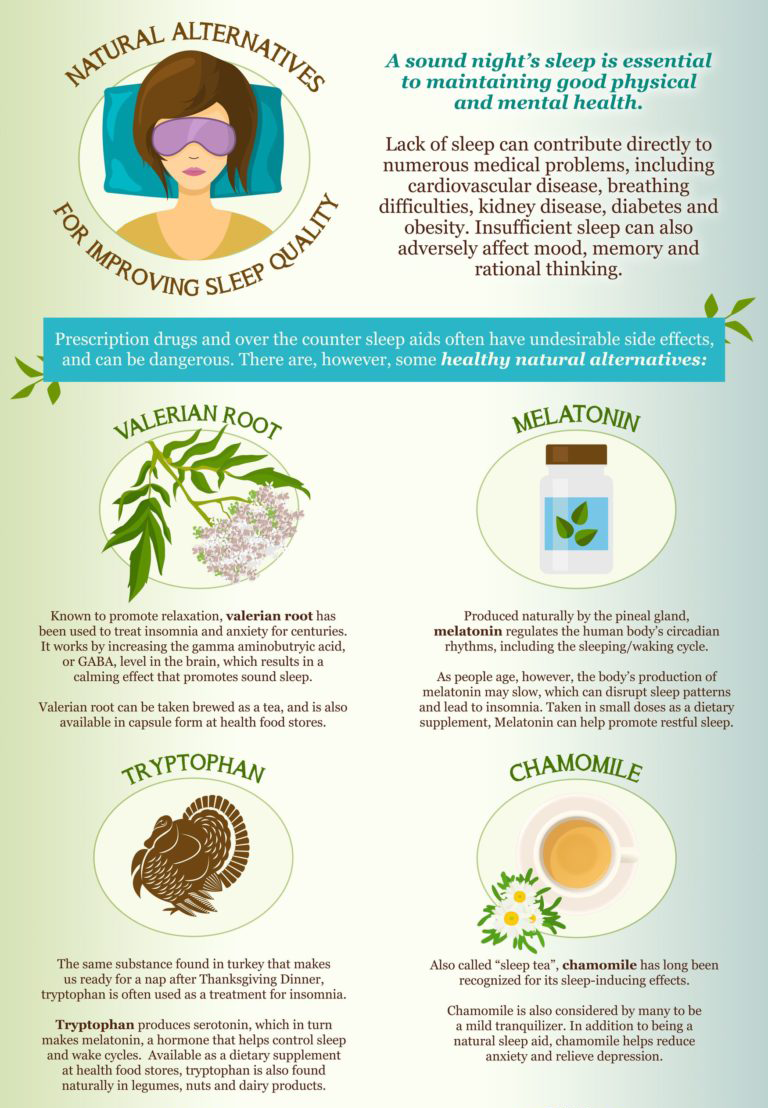
Image Source
Once you speak to your doctor, you can potentially use supplements like Ashwagandha or chamomile tea to soothe your nerves and calm yourself close to bedtime.
7) Incorporate Light Physical Activity Every Day
Depending on your age and mobility levels, you should be getting 20 to 30 minutes of light to moderate activity every day.
For seniors and older adults, consistent exercise keeps your heart healthy and lubricates your joints, builds bone density, keeps you flexible, and promotes overall body strength and longevity.
As a bonus, routine exercise harnesses your extra reserves of energy through the day. So instead of staring at the ceiling come bedtime, your body and mind are tired enough to hit the pillow and fall into a restful, rejuvenating sleep.
8) End the Evening With A Warm Bath
A warm bath soothes muscles and helps them to relax. Instead of a meditation technique, try a nice warm bath soak for around 30 minutes right before you head to bed.
The mind-body connection means that you’ll be able to calm your mind when you use heat to relax your muscles. Or absent a bath, you can always unwind in a therapeutic chair designed for a heated massage before you head to bed.
9) Comfort First
Part of good sleep hygiene is creating the right sleeping environment.
You may already know that your bed is where you sleep, but your sleeping environment includes the details of what mattress, pillow, and even which comforter you use.
You can also amplify the details in your bedroom (like temperature or light pollution) to ensure that it’s designed to promote relaxation and the activity of sleep.
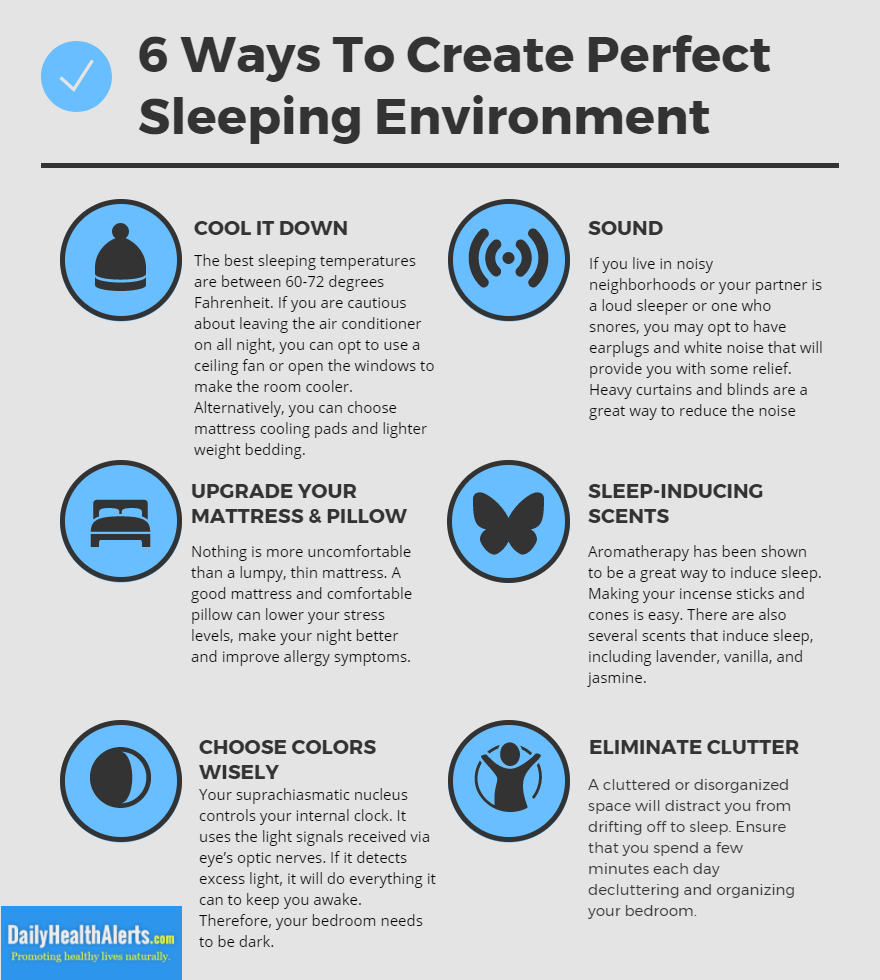
Image Source
Besides your bed, seniors can also use their recliner or sleep chairs for a good night’s sleep – as long as it’s built with a zero gravity positioning.
Some recliners will only move to two positions, so make sure you have a recliner that is built for infinite positioning or zero gravity positioning.
These nine tips can be combined or mixed and matched to suit your sleep’s needs. Remember that you’re trying to create a consistent and dependable routine.
Even if your brain is undergoing inevitable chemical changes, that doesn’t mean that you can’t take steps to act alongside these changes.
The fact of the matter is that incorporating modifications and supports to your sleep are a part of maintaining a high quality of life. This can be your relationships, a network of family and friends, or the devices and methods seen here.
However you end up tackling your sleep, you’ll find that better rest means a better life. That’s an idea worth pursuing!
